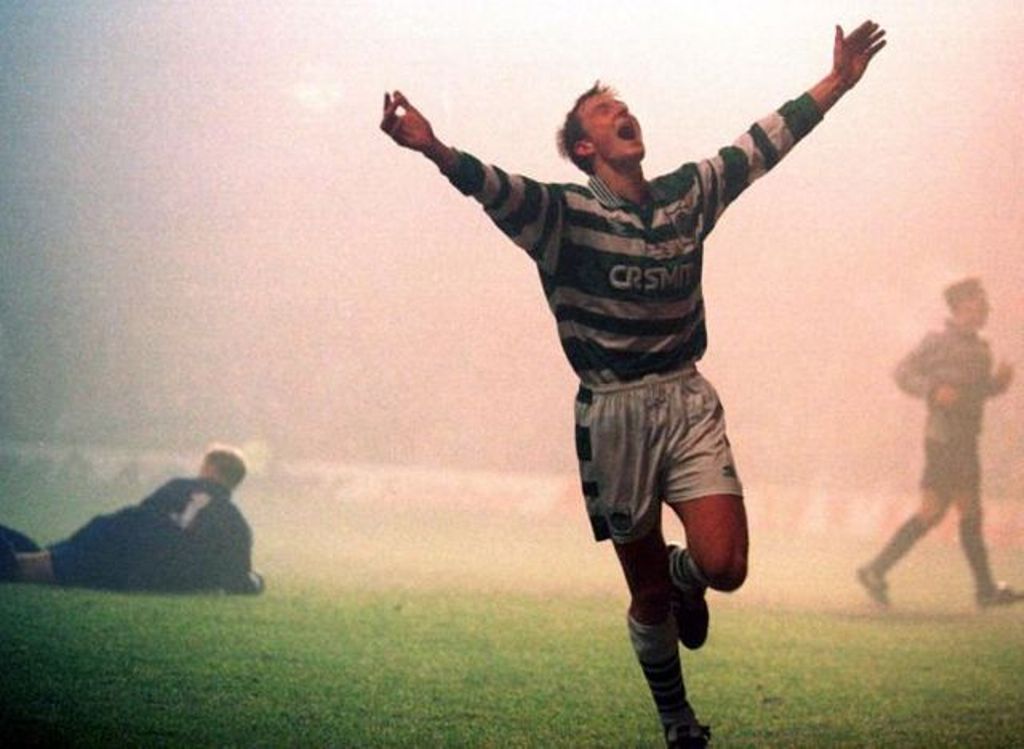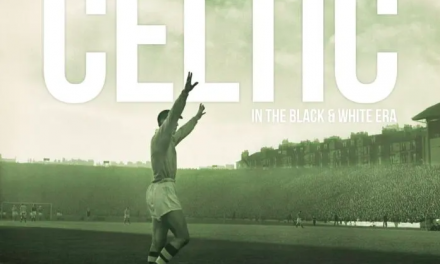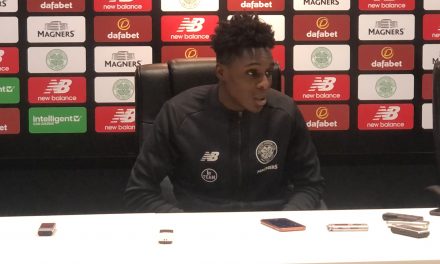A Double and Nine-in-a-Row
- League Position – 1st – Ninth League title in a row – a record
- League Cup – Losing Finalists
- Scottish Cup – Winners
- Drybrough Cup – Losing Finalists
- European Cup – Losing Semi-Finalists
The most outstanding accolade of the season was the completion of nine League championship titles in a row closely followed by reaching the semi-finals of the European Cup for a fourth time they had reached that stage or beyond since 1967. For a club the size of Celtic in a nation the size of Scotland this was exceptional. That they never went on to the final was down to the cheating aspects of their semi-final opponents, Atletico Madrid, and the left-over taste of the nature of the games with them has remained with the club and supporters ever since 1974.
The season began slowly with Jock Stein saying that he wanted to see the team play differently. The early Friendly games saw Celtic playing a one-touch game where the team endeavoured to control the ball and maintain possession. The early season Friendlies in Ireland saw this style of game unfold. These games were followed by the what looked to be annual performance of the Drybrough Cup, a trophy which seemed to challenge everyone to accept it as a legitimate enterprise but, although the teams taking part played out the games fully, there was always the feeling that it was a somewhat half-hearted affair as shown by the willingness to change the rules of the game. This was the first season that two substitutes were allowed in all matches and the Drybrough Cup continued with a half-baked moderation of the offside rule. This experiment continued through the League Cup and was a reflection of views of change within the world of football at the time. Celtic again failed to win the Drybrough losing in the final to Hibernian for the second year running .
The League Cup followed with the bastardised offside rule continuing, Celtic qualifying from the seeded Group Stage behind Rangers who they would meet again and defeat at the semi-final stage. Between that game there were wins against Motherwell after a replay, and Aberdeen. The semi final saw a comprehensive 3-1 win for Celtic with Harry Hood scoring a hatrick. The final against Dundee played at Hampden with a 1:30 kick off due to anti-floodlighting measures imposed under the state of emergency regulations, was a game that neither side wanted to play with the Hampden pitch frozen and rugged. Referee Bobby Davidson had other ideas and the game went ahead. Celtic duly lost to a single goal thus losing the fourth League Cup final in a row.
In the League the Celtic green machine rolled on with generally the expectation that Celtic would win every game they undertook. That might have been the supporters and the pundits expectations but the other teams in the League had other ideas. It was Hibernian that provided the challenge mainly, along with the Tayside clubs and a rejuvenated Motherwell under the new managership of Ian St. John. The games against Rangers saw Celtic win well with 1-0 wins which neither reflected the overrall domination over the blue horde nor told the full story. But a comprehensive lead in the league was established and Celtic lead the table for the greater part of the season. The losses were instructive.
A home game was lost to Dundee in February, the first Sunday game, with McNeill and Hay recovering from ‘flu and George Connelly only just restored to the first team after his voluntary absence from Celtic Park. In fact the problem for Celtic with David Hay and George Connelly tainted the whole of the early season. Hay was one of the few people that George Connelly, an enigma in the minds of many but a potential footballing superstar who had it all, trusted and called a friend at Celtic. When Hay wanted more in his contract he was transfer listed and when he threatened to go on strike he was suspended. Celtic handled the complete situation badly. Hay was wanted by other teams, but what Davie wanted was to stay but not at the terms that Celtic were offering. Celtic wanted the best they could get in allowing a valuable player to leave. George Connelly reacted in solidarity to his great mate, and saw himself dropped for a long period to the Reserves. These were two great players whose ball playing and passing skills were missed.
Eventually it got sorted out and Davie went on to a good season but George broke his ankle in the home leg against Basel and was out for the rest of the season. Their importance as footballers could be gauged by the fact that both were included in the Scotland World Cup squad. The League was won with three games to spare, against Falkirk with a draw. Celtic finished with a four point cushion to Hibernian in the runners-up spot.
The European Cup started with the usual high aggregate thrashing of some unknowns. This year it was Finnish side TPS Turku with 6-1 away and 3-0 home wins. In the second round Celtic were draw against Danish champions Vejle. These were no pushovers and Celtic underestimated them at home with a 0-0 draw badly missing the leadership of Billy McNeill. They got out of jail free in Denmark with a 1-0 win playing a holding game after going ahead. This brought Celtic to face Swiss champions FC Basel in the quarter finals. Basel had grown and moved on immeasurably since the team that Celtic had overcome in 1969. They were well organised and confident. The away leg was first and Celtic lost 3-2 with Evan Williams losing two goals he should have saved and sealing his fate for the taxi at the end of the season.
With Scotland keeper Ally Hunter injured Stein had to resort to Denis Connaghan, the No. 3 in the blind spot position for the return. It was a tense game not helped when George Connelly broke his ankle after only five minutes. But Kenny Dalglish and Dixie Deans, who was rapidly turning into the ace scorer of the season, had Celtic 2-0 up and Tommy Callaghan got the aggregate equaliser taking it to extra time. Barely into the first period Steve Murray, who played a major part in the season, lobbed a beautiful ball over the goalkeeper and Celtic were through. That brought Atletico Madrid and a return of Argentinians to Celtic Park. So much has been written about the game. The home leg was a travesty of football and the 0-0 draw saw the Spanish side celebrating like they were already into the final. The away leg which UEFA insisted had to be played, was pure intimidation. Celtic took their collective eyes off the ball and dulty lost 2-0. So another year and through to the semi and undone by bad sportsmanship. The feeling still lingers with any mention of Atletico Madrid.
Celtic won back the Scottish Cup with a 3-0 win over Dundee Utd. The run had started with two 6-1 wins over Clydebank and Stirling Albion. Motherwell proved harder opposition requiring a replay after a 2-2 draw at home. The 1-0 semi final win against Dundee bore no relation to the domination Celtic showed over Dundee throughout the game. And two goals in 25 minutes saw Celtic kill the final.
Of the players so far unmentioned Danny McGrain made his mark this season establishing himself as an overlapping defender of exceptional quality. Billy McNeill led from the front at the back (so to speak…) Everyone wanted to know how long he would go on playing and it looked as if he would think about retirement. The next season would see his Testimonial and his final season. Bobby Murdoch went on a free transfer in September to Middlesbrough where he would have a second career. Pat McCluskey established himself in the team and vied for a starting role with George Connelly. If anything Jimmy Johnstone faded from sight at the start of the season and Stein told him to buck his ideas up and screw the nut. Jinky duly applied himself and he was back to his best for the latter half of the season going on to be kicked black-and-blue by the goths of Madrid. Brian McLaughlin who had been seen as the up-and-coming new ‘wunderkind’ suffered a serious knee injury which saw him miss much of the season. And the forwards just rolled on. Deans was top scorer in Scotland,; Harry Hood continued to confound people; Dalglish was the best Scottish product since Macari left; Paul Wilson had a supersub tag; and Bobby Lennox, now over 30, confounded everyone with his bursts of speed. If there was a failure it was the inability of Jimmy Bone to fit in and Andy Lynch languishing in the Reserves.
But the team worked well as a unit. There were young players coming through (a certain Tommy Burns was called up at the end of the season from Maryhill Juniors where he had been farmed out) and there was no reason to believe that the following season would again see Celtic challenging.
Enjoy;
iTunes – https://itunes.apple.com/gb/podcast/celticunderground-celtic-football/id305526084?mt=2
Spotify – https://open.spotify.com/show/1DP71JuyXov72ehwiN1hcg
Stitcher – http://www.stitcher.com/podcast/harry-brady/the-celtic-underground?refid=stpr
RSS Feed – http://celticunderground.libsyn.com/rss
Audioboom – https://audioboom.com/channel/celticunderground
Spreaker – https://www.spreaker.com/user/harrybradycu
YouTube – https://www.youtube.com/user/HarryBradyCU
TuneIn – https://beta.tunein.com/radio/The-Celtic-Underground-p1012979/
Player FM – https://player.fm/series/celticundergroundthe-celtic-football-fan-podcast




